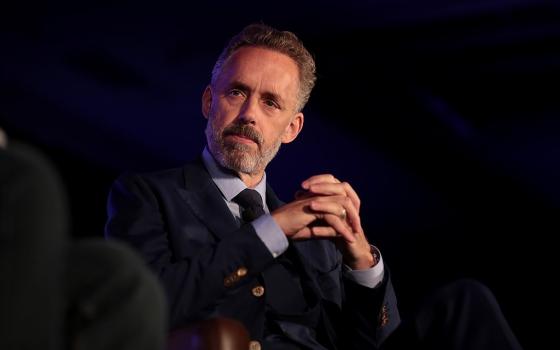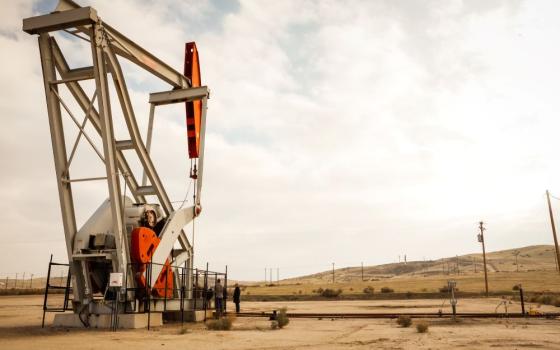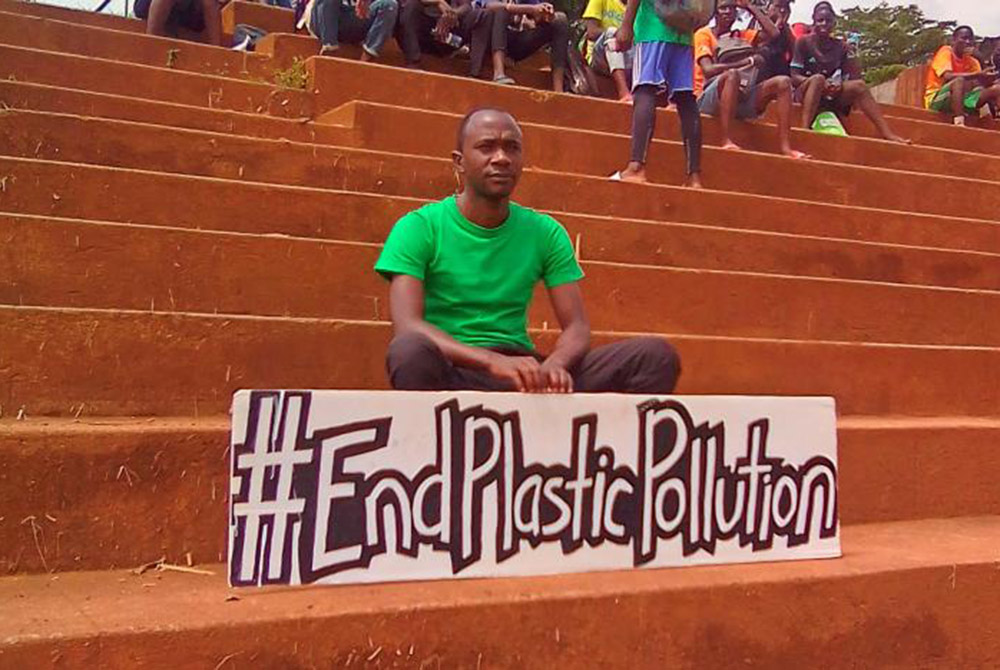
Sadrach Nirere, communications manager at Fridays for Future Uganda (Reset.org)
Editor's note: This story originally appeared on Reset.org, a German nonprofit organization focused on sustainable development. It is republished here as part of Covering Climate Now, a global journalistic collaboration strengthening coverage of the climate story.

All too often, the conversations around climate change erase the voices of the people who are most affected by it.
Do an internet search for "climate activist" and you'll be presented with several pages featuring the name of one famous Swedish teenager. Greta Thunberg's achievements are undoubtedly astounding — from kickstarting the global climate strikes, to popularizing concepts such as flygskam and even shaking up the stuffy world of the climate conference with her impassioned speeches. But the media's ongoing focus on this one particular activist's story is a reflection of wider mainstream climate reporting — that often lacks diversity when it comes to voices, experiences and opinions.
Not only are people in the Global South often among the most vulnerable to rising global temperatures, but they are also activists, educators and changemakers — fighting for a better world, innovating and inspiring others to tackle the issues that we as a planet face.
As part of Reset's Voices of Climate Justice series, we speak in this article with Sadrach Nirere, communications manager at Fridays for Future Uganda. Uganda is the youngest country on the planet right now, with 78% of the population below 30 years old, making it ideally placed for a youth-led climate activist movement. We talked to him about the effects of climate change on his community, the positive climate impact he is working to create and the role digital technologies have had on his activist journey.
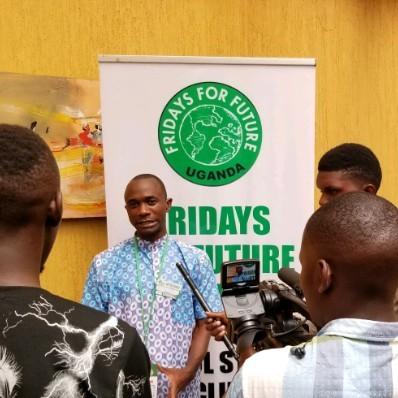
Sadrach Nirere (Screengrab via LinkedIn)
Reset.org: Sadrach, when did you first become passionate about climate change?
Nirere: As someone born in an agricultural rural district of Kiboga, I grew up knowing that our survival depends on seasonal rainfall. As kids, our after-school time was about hunting for fruit trees and running after cattle in the nearby bush. It was fun. But this has changed, the rainy seasons are no more and the heat of the sun is far too strong. Over time I have witnessed for myself how a climate that is breaking down is making it harder and harder for us to survive. My family joined others to migrate from the rural areas, running away from landslides, droughts and desertification — only to find polluted air, contaminated waters, plastic pollution and floods in urban areas.
A presentation by Green Climate Campaign Africa at my university taught me more about climate change. The information was packaged in a way that was informative and inspired us to act — that kind of knowledge was something I had never had access to in my earlier years at school.
And what about the student strikes? What was your motivation for getting involved?
I decided to join together with other students to start a green campaigning group at the university. Through our work and using digital platforms, we learned about Greta and what other students in Europe and around the world were doing. That inspired to further the fight and we launched Fridays For Future Uganda. As students in Africa we couldn't sit down and just watch as fellow students in Europe were fighting for something that affects all of us.
Advertisement
Now the climate movement — through protests and other activities — is starting to make wins. And while the decision makers might continue trying to just ignore our fight, it's getting harder and harder for them to do that. In Kenya, for example, 350.org mobilized locals and stopped the Lamu coal mine, what would have been first coal power station in Kenya. In Uganda, as Fridays For Future we have petitioned the speaker of parliament and we are now headed for the parliamentary natural resources committee. The fight continues, despite being looked at as young people — we understand that we are a climate generation and this is our fight.
How do you see the role of the digital world in your own development as an activist?
Digital media has helped me to learn and network, but even more so it has offered me a platform and given me space to share my work with others. It is an opportunity to be able to create an ever-growing audience to share with. It makes it easier to reach people and helps to make activism work attractive as well as informative.
We've also had to move some of our activities online because of the coronavirus. Our communications team did a survey on the current #ClimateStrikeOnline. We found out that within Uganda, we have a relatively small local digital community. This is because there is limited internet access in many regions of the country, therefore our online protests have limited digital reach. Many Ugandans do not own a laptop or a smartphone, which makes it difficult to join in with online activities. Also, many of our leaders do not use digital platforms like social media, so they cannot see our protest messages and now with social distancing guidelines it's making it even harder to get in touch with them.
'Our natural world is disappearing before our eyes. We have to save it. Climate action must be our daily duty. Until then, we are all just victims of this crisis.'
—Sadrach Nirere
How else has your activism work been affected in the past few months?
The coronavirus pandemic has affected our fight, but it's not stopped us. The lockdown has limited our protest time, reduced participation and put on hold all of our activities within the local communities. The fight against the coronavirus is also being used as an excuse to put on hold the enforcement of environmental regulations.
The global response to the corona crisis is what we need to tackle the climate crisis, too. It's shown us that there can be global compliance on guidelines that work for all of us. The support given to health budgets is the same consideration that must be made for accelerating climate solutions and improving public services. All of this must act as a wake-up call for more collaboration, sharing, support and mutual exchange of resources that build a resilient society.
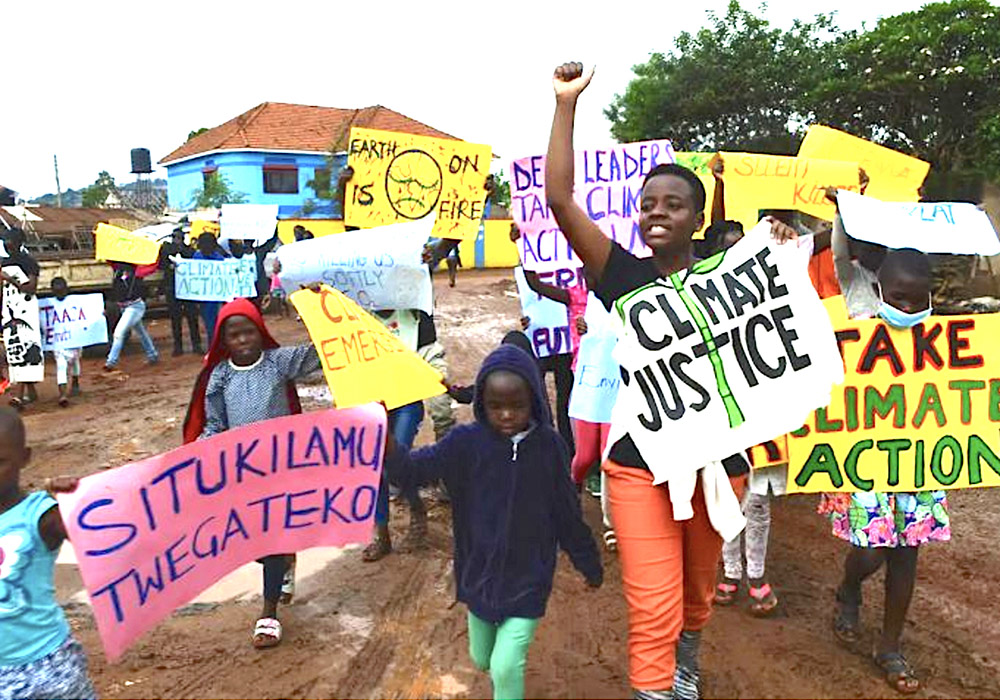
Screengrab from Fridays for Future Uganda website (Provided photo)
When you're out protesting, what does the poster say that you hold up? And who do you want to see it?
As an individual I have focused my activism on the climate crisis and the impact of plastic pollution. My posters have messages like "Our Actions, Our Future", "People Over Profit" and "End Plastic Pollution". I also have posters in my local language that read "Tukuume Obutonde" ("Protect Nature") and "Tomansa Kasasiro" ("Stop Dumping Waste").
All of my messages are communicating, illustrating and demanding serious action from leaders, governments and corporations, as well as behavior change from individuals. Together with other activists, we hold global climate strikes with the hope of achieving a fundamental system change. As part of this change we'll implement our climate action plans, work towards global agreements and have more participation and inclusion.
Even in the middle of the coronavirus pandemic, the climate crisis is not going on holiday. You can add your voice and together we can achieve more - like stopping a new coal mine or pushing for a desired policy change. Our natural world is disappearing before our eyes. We have to save it. Climate action must be our daily duty. Until then, we are all just victims of this crisis.
[Reset.org editor's note: Fridays for Future Uganda has a super-informative and very active Twitter account where they regularly share information about local climate issues and their campaigning work. You can also keep up to date with Sadrach's work — in particular his fight against plastic pollution and the corporations that fuel it — by following him on Twitter right here.]





